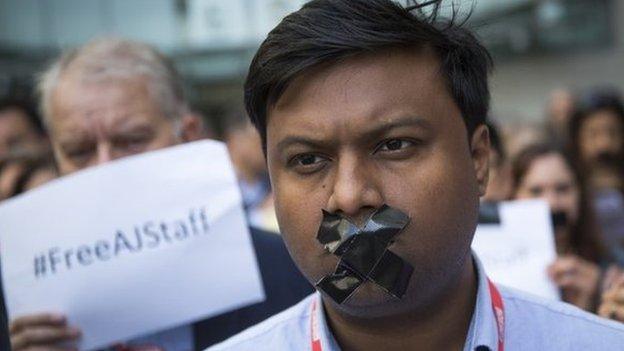The year of living far too dangerously
- Published
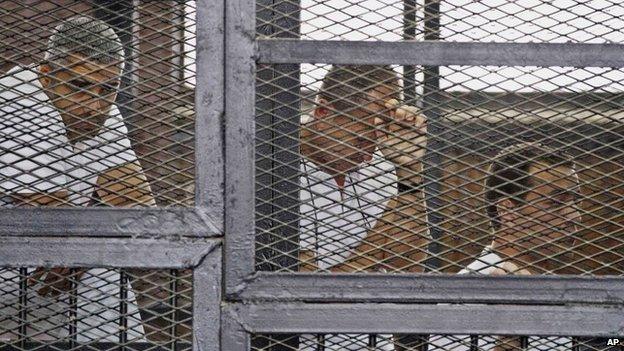
Three journalists who were working for al-Jazeera remain behind bars
There's an old thriller called The Year of Living Dangerously, set in Indonesia's civil war during the 1960s. It tells a suspenseful tale of an Australian journalist despatched to replace a colleague at a dangerous time.
In the end, injured and in hiding, he makes a narrow escape from Jakarta in the wake of a failed military coup.
The real life story of Australian journalist Peter Greste, who went to Cairo to fill in at al-Jazeera's bureau and ended up in jail, may soon have a happy ending too. Not only for him, but also his colleagues Mohamed Fahmy and Baher Mohamed.
One year since their arrest, a series of steps and signals suggest there may now be a way out for the three journalists.
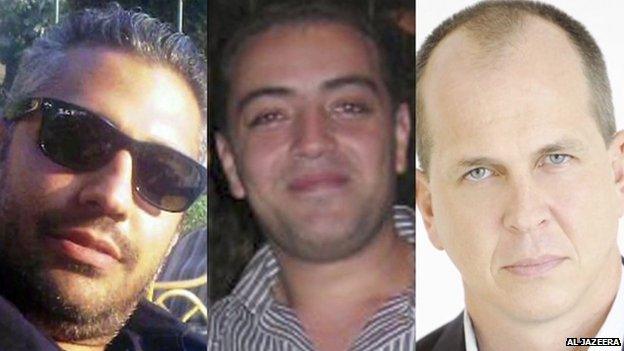
From left, Mohamed Fahmy, Baher Mohamed and Peter Greste
The trio were convicted in a controversial trial of "distorting the country's image abroad" and aiding the Muslim Brotherhood, which is now declared a terrorist organisation in Egypt.
But recent meetings, including talks between intelligence officials, point to a growing rapprochement between Cairo and Qatar, which owns the al-Jazeera network and was a strong backer of the ousted Muslim Brotherhood.
There has also been speculation that al-Jazeera's suspension of its local Arabic channel, Mubasher Misr, whose coverage infuriated the Egyptian authorities, has helped soothe relations in the run up to the appeal trial set for 1 January.
The three men are now serving seven-year sentences, with Baher Mohamed facing three extra years on a charge of possessing ammunition.
Egypt's President Abdul Fattah al-Sisi recently hinted at a possible pardon.
And a new law, which allows foreign nationals to be deported rather than jailed, provides another possibility for Peter Greste and Mohamed Fahmy, who is Egyptian-Canadian. But it also raises concerns that their Egyptian colleague would be left behind bars.
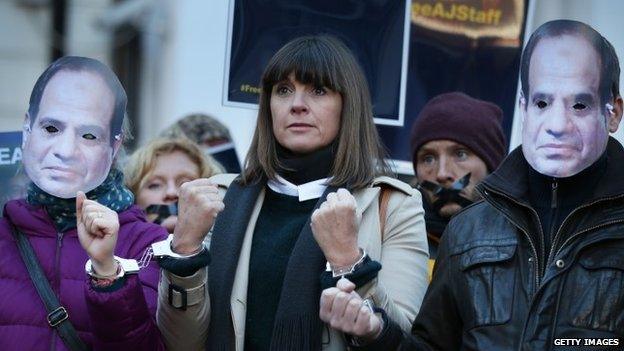
Al-Jazeera journalist Sue Turton with protesters wearing masks depicting President Abdel Fatah al-Sisi
"We are optimistic and hopeful and confident that next year will see a major turning," remarked Peter's father Juris in an interview on the BBC World Service. "But we have also learned to expect the unexpected."
"It was a very tough year, a life-changing year" reflects Marwa Omara, the fiancee of Mr Fahmy, the former al-Jazeera bureau chief in Cairo. "It's very hard to see an award-winning professional journalist accused of being a terrorist."
In a punishing prison life, the men have found ways to overcome moments of deep despair, including solace drawn from the solidarity of journalists and human rights organisations the world over.
Newsrooms have turned out en masse, including the BBC's, with strips of tape crossed over mouths, to protest against what has been widely seen as an assault on press freedom.
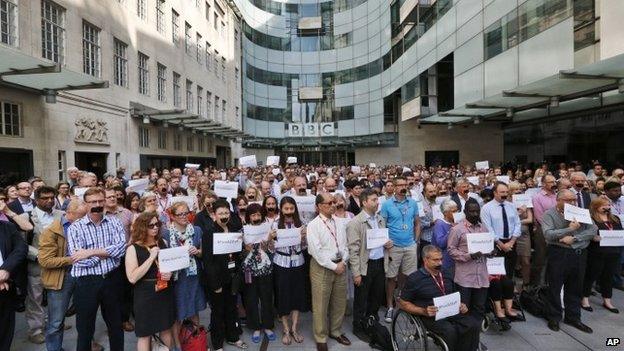
BBC journalists and staff protested outside the organisation's headquarters this year
"We have changed something fundamental," wrote Peter Greste in an open letter sent from his cell before Christmas, external.
"The noise you all have been making sends a clear and unequivocal message to politicians around the world: a free press is an indivisible part of a free society."
That, he added, is why "our cause, as opposed to simply our case, is so important, and not just for Egypt."
Mr Fahmy expressed similar sentiments in an earlier letter published by the Canadian Journalists for Free Expression (CJFE), external to mark what was then "the 300th day of our intolerable imprisonment."
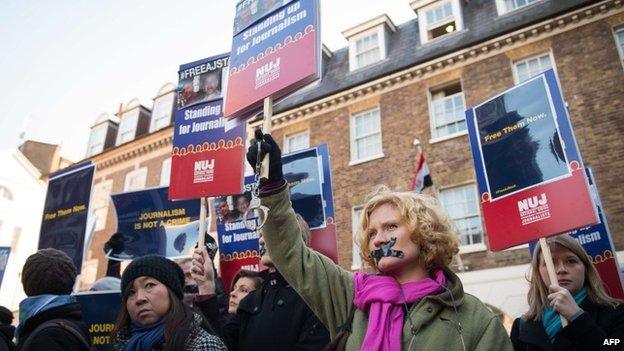
Protesters outside the Egyptian embassy in central London on 29 December 2014
"The past 300 days have proven to the world that compromising just one journalist sparks the wrath of all."
But his letter's opening salutation to "supporters, doubters, and those meddling in between" hinted at the high stakes geopolitics and dangerous discourse that also lies behind this high profile trial.
This Cairo case is one of many in a year when all too many journalists were targeted and trapped, and paid an unprecedented price, for just doing their job.
Most shocking has been the horrific fate of American freelance journalists Jim Foley and Stephen Sotloff, who were savagely beheaded and paraded on social media by Islamic State in Syria.
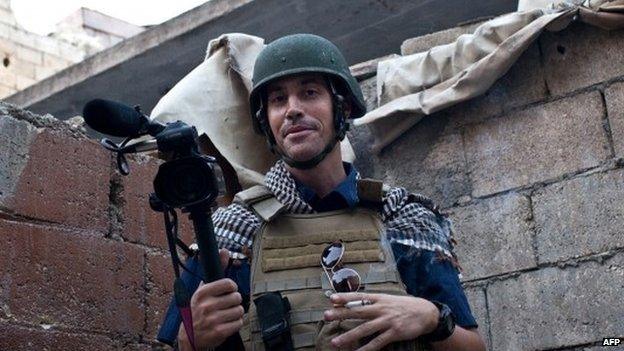
US reporter James Foley was among the captives beheaded by Islamic State
Iraqi journalist Raad al-Azzawi suffered the same horrible death, as did other Iraqi and Syrian journalists, not to mention far more local people who didn't make global headlines.
Swedish Radio correspondent Nils Horner was shot in the face by two gunmen on a street in Kabul in a rare targeted assassination of a foreigner.
Veteran Associated Press journalists Kathy Gannon and Anje Niedringhaus were shot at point-blank range by an Afghan police officer in the eastern Afghan province of Khost while reporting on the Afghan elections. Anje died instantly. Kathy is making a slow but steady recovery from multiple gunshot wounds.
In neighbouring Pakistan, prominent TV anchor Hamid Mir survived an assassination attempt. So did popular columnist Raza Rumi who also had to flee his country. They are only two of many journalists now at risk there, and in all too many other countries.
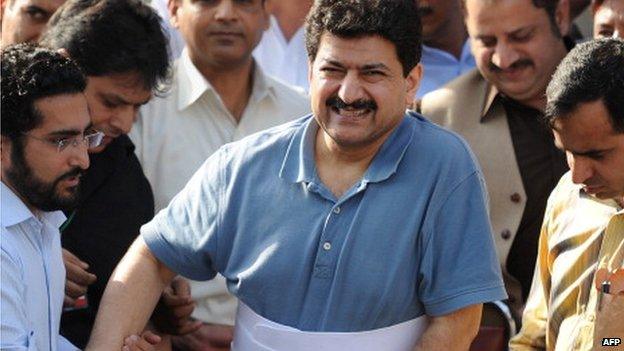
Journalist Hamid Mir survived an April attack by gunmen in Karachi, Pakistan
The Committee to Protect Journalists (CPJ), a global watchdog for press freedom, describes the past three years as the most deadly period for the media since it began collecting data in 1992.
Almost half of the deaths have been in the Middle East, with Syria still the world's deadliest country for journalists, for the third year in a row. And for the third year running, more than 200 were jailed around the world.
When statistics are so grim for the media, it's a worrying measure of how harrowing life is for many more people struggling just to survive in hard places journalists take risks to report on.
As 2014 ends, many families worldwide are hoping for good news of loved ones behind bars, beyond reach, missing without a trace.
Freedom for three men in a Cairo jail would be very good news at a time when all too many journalists still work in all too dangerous times.
- Published24 June 2014
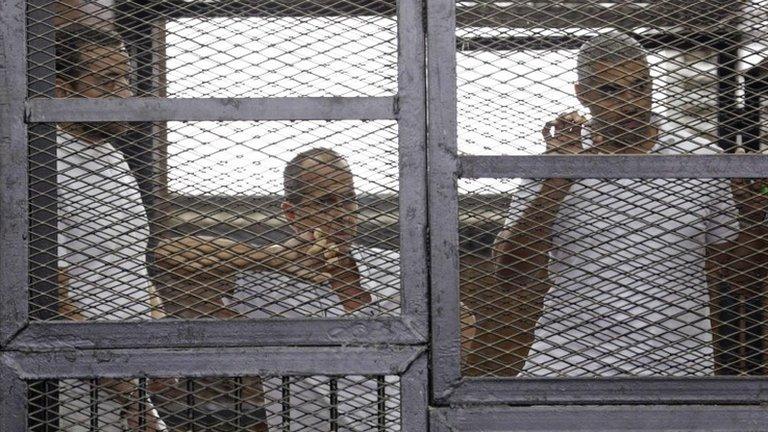
- Published13 February 2015
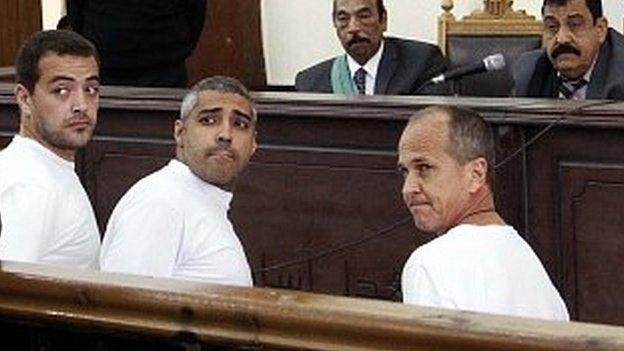
- Published24 June 2014
